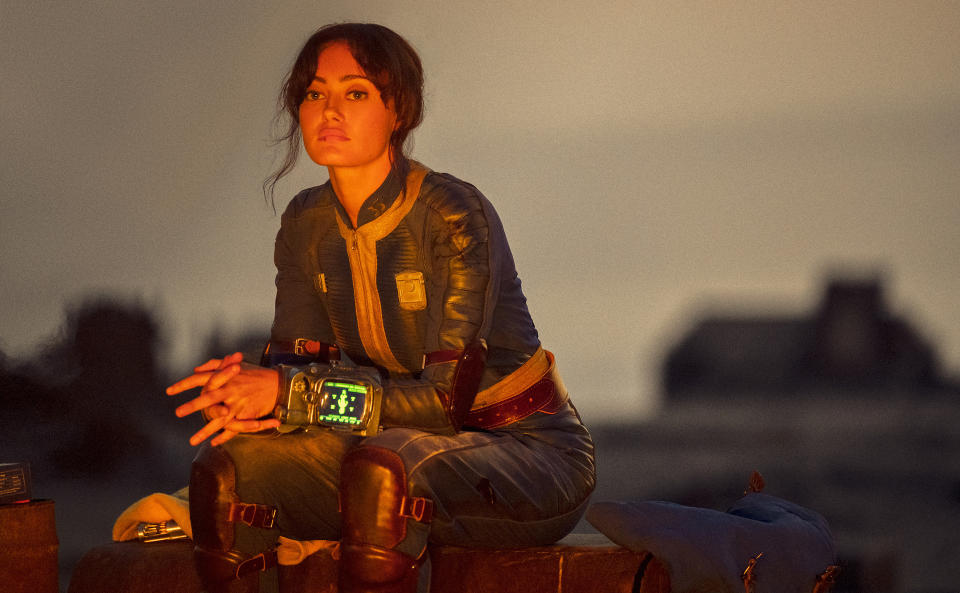‘Fallout’ Concludes with a Moral Conundrum

[Editor’s Note: The following article contains spoilers for Prime Video’s “Fallout,” including the finale.]
After eight episodes of flashbacks and intertwined perilous adventures, Prime Video’s “Fallout” reaches its climactic conclusion, with the door wide open to keep going. Set in the sprawling and fruitful world of Bethesda Softworks’ popular video game series, Geneva Robertson-Dworet and Graham Wagner’s dystopian drama brings Season 1 to a head in the final episode with a dizzying number of revelations.
More from IndieWire
'The Holdovers,' 'Succession,' and 'The Bear' Win Top Prizes at WGA Awards (Complete Winners List)
'SNL' Parodies 'Barbie' and Taylor Swift as Emily Blunt Crashes Ryan Gosling's Monologue
Most of those twists come back to Vault-Tec, the organization behind nuclear fallout shelters like Lucy’s (Ella Purnell). Vault-Tec controls the vault population by assigning old executives as Overseers; Vault-Tec destroyed Shady Sands in order to maintain supremacy; Vault-Tec controls the Brotherhood of Steel; and most damning of all, Cooper’s past (Walton Goggins) reveals that Vault-Tec may have even dropped the first bomb.
All those threads connect Lucy, Norm (Moises Arias), their father Hank (Kyle McLachlan), Maximus (Aaron Moten), Moldaver (Sarita Choudhury), and the Ghoul (Goggins). All of their circumstances, everything about their reality, can be traced back in some form to Vault-Tec. When the Ghoul invites Lucy to “Come and meet your makers,” it’s an implicit invitation to dismantle Vault-Tec and everything it stands for (and probably to find his family).

“Fallout” takes a pretty clear stance on people who treat others as pawns and use war as a means to achieve their version of peace: that those people are evil and their methods are wrong. As always it’s disorienting to see this consistent messaging in fiction and the opposite play out in business and politics, where governments and corporations finance murder and destruction and invent their own justification.
It’s dissonant, to say the least, while living in our times.
As Ben Travers pointed out in IndieWire’s review of series, “Fallout” skews perceptibly anti-capitalist in the back half of the season, “in yet another example of Amazon having its cake and eating it, too,” which amounts to “only surface-level substance.”
“If you can separate the slick world-building from the soul-deadening cynicism, ‘Fallout’ should fly by as the bloody action spectacle it’s made to be. Otherwise, it’s hard to shake the creeping sensation that your basic goodwill is under attack,” he wrote.
Though it ends with most of the characters sharing a disdain for Vault-Tec, “Fallout” stands apart from many similar stories. Even with a common enemy, the characters are hardly united. Maximus is still firmly entrenched in the Brotherhood, where he’s hailed as a hero for killing Moldaver; whatever status that may afford him within their ranks, none of his actions thus far suggest that this is a man about to lead the revolution from within. Lucy’s revelations spur her to immediate action, while a trapped Norm faces disciplinary action or worse back in Vault 33 — the best case scenario for his survival is to simply resume living normally and pretend he never went to Vault 31, which he’ll have a tough time doing.
So all hope for humanity falls on the girl and the Ghoul, the latest unlikely post-apocalyptic travel companions to hit TV (inviting comparison to “The Last of Us” until you remember that these guys cut off each other’s fingers). The Ghoul doesn’t appear to have a bigger moral mission than finding his family, while Lucy is all about morality and has been since the moment she arrived on-screen. She may not be saying “Okie dokie” with the same bright-eyed enthusiasm as before, but her principles remain in tact even after her father’s betrayal. “Fallout” hardly has the tone of a classic story where the bright-eyed hero saves the day, and if the series continues the showrunners will undoubtedly delight in dismantling more heroic tropes along the way.
“Fallout” is now streaming on Prime Video.
Best of IndieWire
The 22 Best Spy Movies, from 'Enemy of the State' to 'North by Northwest'
The 12 Best Thrillers Streaming on Netflix in April, from 'Fair Play' to 'Emily the Criminal'
Quentin Tarantino's Favorite Movies: 61 Films the Director Wants You to See
Sign up for Indiewire's Newsletter. For the latest news, follow us on Facebook, Twitter, and Instagram.

